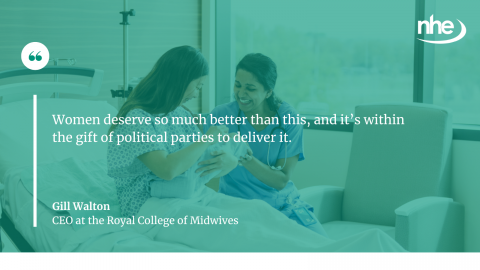As general election season enters its second phase, NHS leaders continue to raise awareness of the issues the next government needs to address.
This time the Royal College of Midwives (RCM) has highlighted that sufficient staffing along with the right training and education would be enough to combat the challenges faced in the maternity care sector.
UCAS figures indicate that the number of midwifery students took a sharp upturn from 2020 to 2021, but reduced to lower than pre-pandemic levels in 2023 — something the RCM described as “extremely concerning” last summer.
This is in addition to recruitment figure estimates indicating that the NHS in England alone has a 2,500 workforce gap.
Although this remains a problem, retaining existing skilled staff is a headache for leaders too, according to the RCM, as it warns that insufficient attention has been given to changing some of the working practices that cause staff to leave the profession.
Despite the maternity sector being predominantly female, for example, limited flexibility is allowed for caring responsibilities, meaning some people have to either leave their job altogether or only offer bank shifts, which is more expensive for the NHS.
With this mind, the RCM is calling on whoever forms the next government to reform working patterns, including putting an end to rigid 12-hour shift patterns.
“We have to find a way of balancing the needs of those women and families accessing maternity services and the women, because they are almost all women, who work in them,” said the RCM’s CEO, Gill Walton.
Walton added: “We know there are some services that are really innovating in this area. We know it can be done. We want to work with the incoming Government to amplify this, to share good practice and to help create a service that values the staff that work there.”

The union has also shone a spotlight on perinatal mental health and ensuring the safety of women during pregnancy as a whole.
“One of the biggest causes of maternal death during pregnancy and within a year of birth is suicide,” explained Walton.
She continued: “That’s both shocking and avoidable, if we have the right staff to provide the mental health support women need. Sadly, even when services have mental health specialist midwives, they get pulled into other areas — again, because there are simply too few staff available.
“Women deserve so much better than this, and it’s within the gift of political parties to deliver it.”
According to the RCM, compensation payments as a result of maternity incidents reached north of £1bn last year — this is equivalent to a third of the entire maternity budget.
The royal college points to staff shortages and a lack of multidisciplinary training as the root causes of these issues. It emphasises that if investment was funnelled into these areas:
- women would receive better care;
- staff retention would improve; and
- the NHS would save money in the long term.
Gill concluded: “Every midwife and maternity support worker wants to be able to deliver the best and safest care to women and families. Unfortunately, too often and in too many of our Trusts and Health Boards there are too few staff, meaning care is spread too thinly. We know that staff shortages compromise safety.
“Those shortages also mean that there’s no time for staff to update their skills, and, just as importantly, to train alongside their obstetrician colleagues so that teams work well together. That’s why we need more midwives and MSWs — the right staff in the right place with the right education and training to deliver good, safe care.”
Image credit: iStock



















